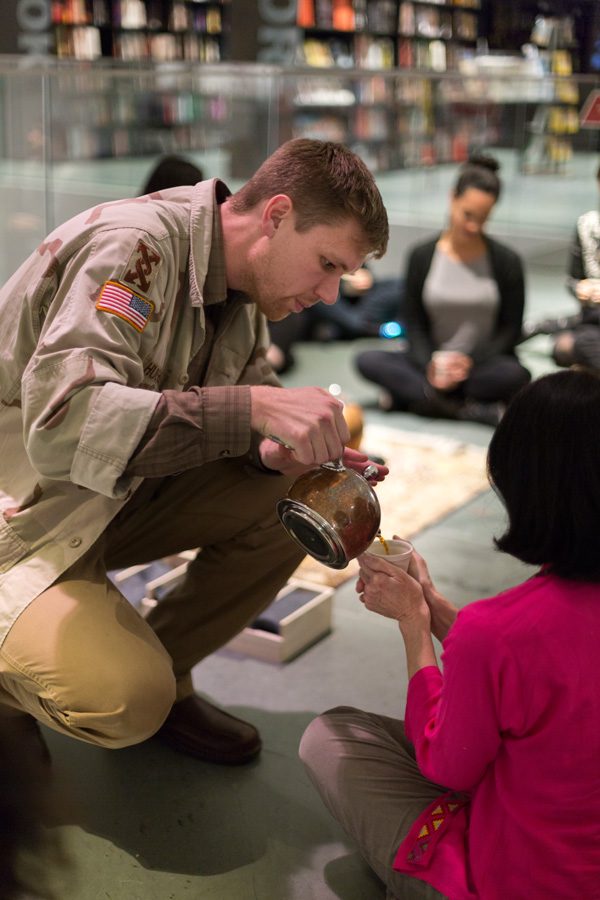Performance explores humanity one cup of tea at a time
Aaron Hughes (Graduate School ‘09) pours tea as a part of The Tea Project’s tea ceremony performance. Hughes and fellow artist Amber Ginsburg will perform the tea ceremony at the Arts Circle Celebration on June 4.
May 26, 2016
A&E
In “The Tea Project,” a performance that will be part of the upcoming Arts Circle Celebration on June 4, the complex power of humanity will be demonstrated through something seemingly simple: cups of tea.
The Tea Project is a performance and conversation created by Aaron Hughes (Graduate School ‘09). In the performance, Hughes acts as the host of a tea ceremony, he said. As the host, he tells stories and asks questions to engage audiences in dialogue about the dehumanization of imprisoned people around the world and in their own backyards.
The project stemmed from experiences Hughes had when he was deployed in the U.S. Army in Iraq, and the ones his friend, Chris Arendt, had working at the Guantanamo Bay detention camp in Cuba.
Hughes served in Iraq in 2003. During this time, Hughes said he was told to never interact with Iraqi citizens, who often approached soldiers to offer them gifts, such as Iraqi tea.
In 2009, Hughes attended the International Labor Conference in Erbil, Iraq. He said, because of his previous experience, he had never tasted Iraqi tea until the conference and decided he wanted to bring the Iraqi people’s generosity home in the form of an art project.
Arendt’s experience also contributed to “The Tea Project,” Hughes said. Arendt worked at the Guantanamo Bay detention center at about the same time Hughes was deployed to Iraq and Kuwait. There, Arendt’s job was to confiscate the styrofoam teacups that detainees used to drink.
“He had to go from cell to cell collecting these styrofoam cups that were scrawled all over with flowers, and he thought it was ridiculous that these cups were somehow a security threat,” Hughes said. “That’s where the project comes from — these two stories of dehumanization.”
Before beginning his studies at Northwestern, Hughes worked at OPENSOURCE Art, an artist space in Urbana-Champaign, where he met current partner for “The Tea Project,” artist Amber Ginsburg.
Ginsburg focuses much of her work on lost histories, often lost military histories, and recreating them through art. Because of their similar interests and her experience creating models of artifacts, Ginsburg said Hughes contacted her in 2013 to help him with “The Tea Project.”
“Aaron asked if I was interested in becoming part of ‘The Tea Project’ to make 779 tea cups,” Ginsburg said. “Making a cup of tea with a single person can point to one of the most striking and disturbing points in American human rights history. That shift in scale is what threw me instantly into participating in the project.”
The 779 teacups represent the number of detainees that have been held at Guantanamo Bay since 2002, each cup a representation of their humanity, Hughes said. Most of the teacups will be brought to the performance at NU, he added.
Practice program assistant Matthew Martin explained the complex themes in Hughes’ work is one of the reasons he is being featured in the Arts Circle Celebration next weekend.
“It’s not something that gets brought up at celebratory events like this,” Martin said. “It’s a nice counter to some of the other (more whimsical) events throughout the day.”
Through bringing this project to his alma mater in particular, Hughes said he wants to challenge people through his art. Especially in light of International Torture Awareness month in June, Hughes said he wants people to consider their part in the legality of torture because it’s not as far from home as people may assume.
“We want to create a space where people think about torture,” he said. “We can look at the underpinning Islamophobia and racism of these policies, and we can look at the humanity and generosity (that exists) despite this.”
Email: [email protected]
Twitter: @sophiemmann












